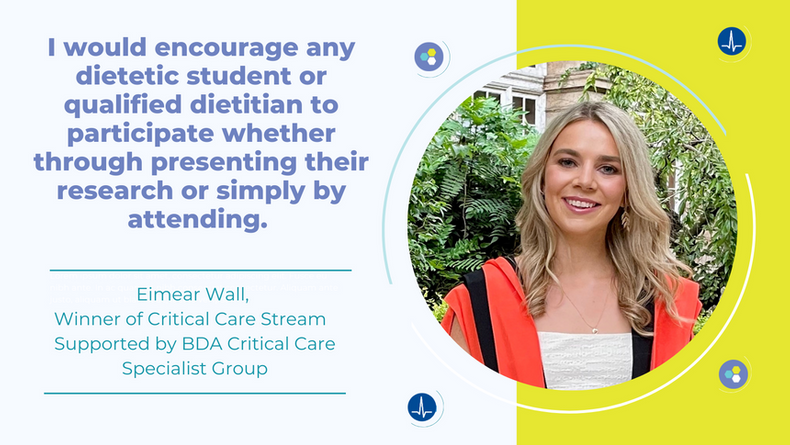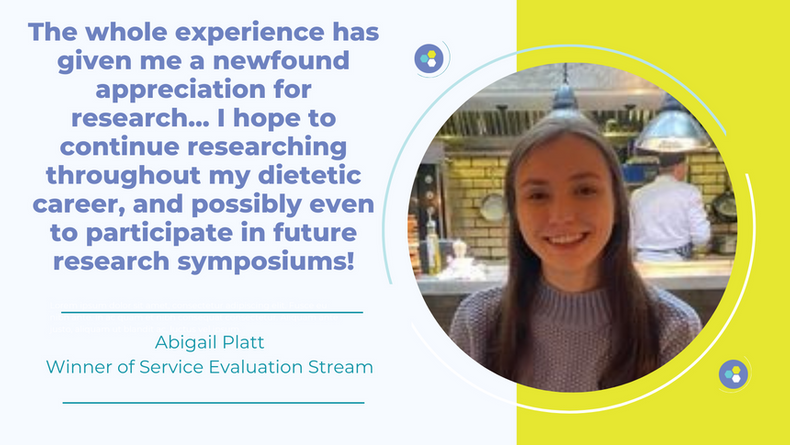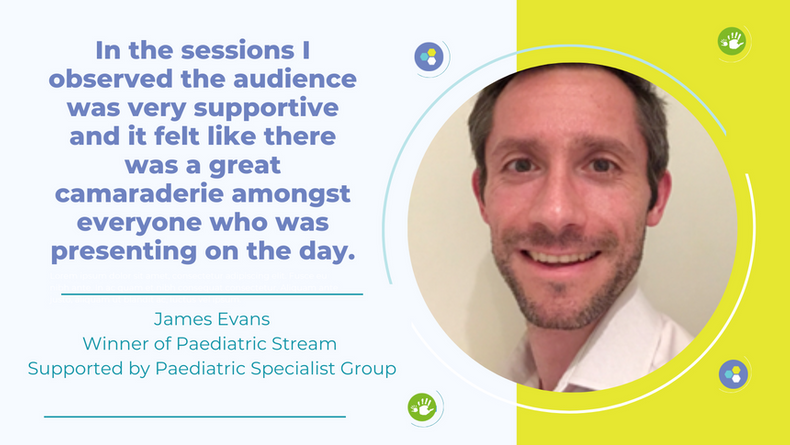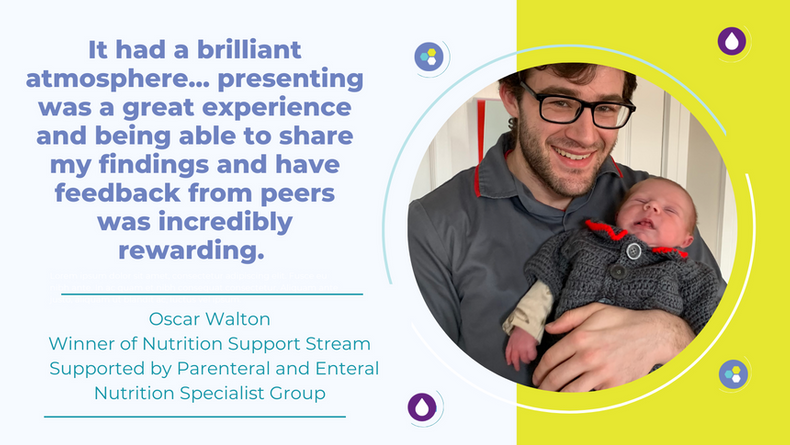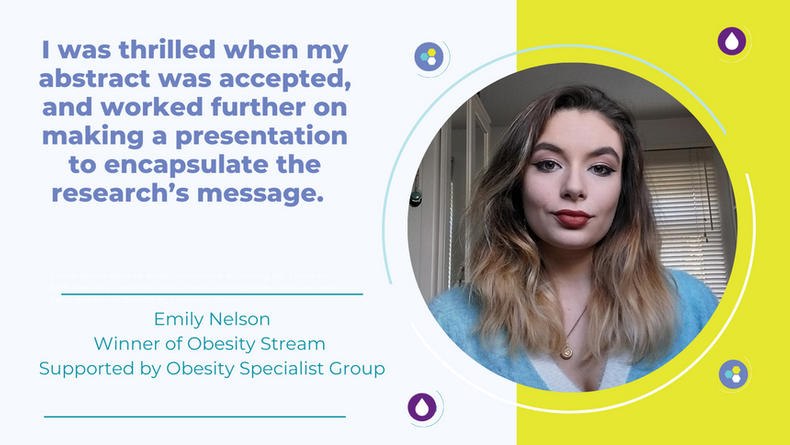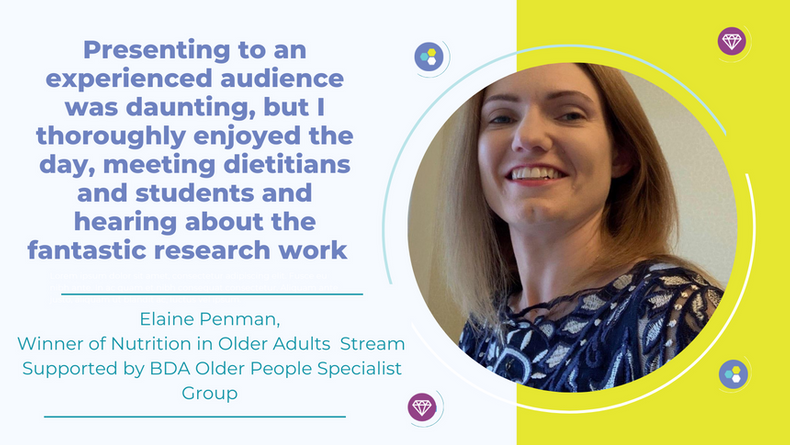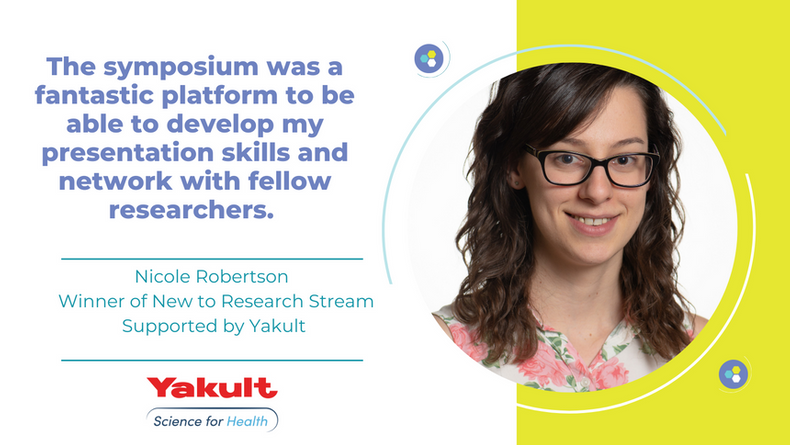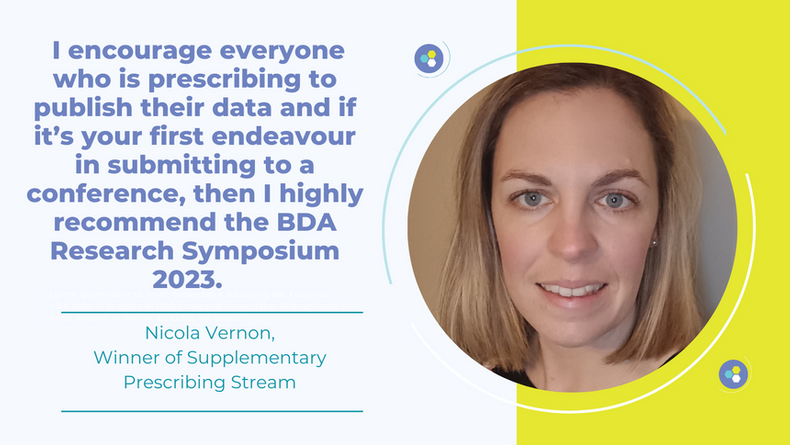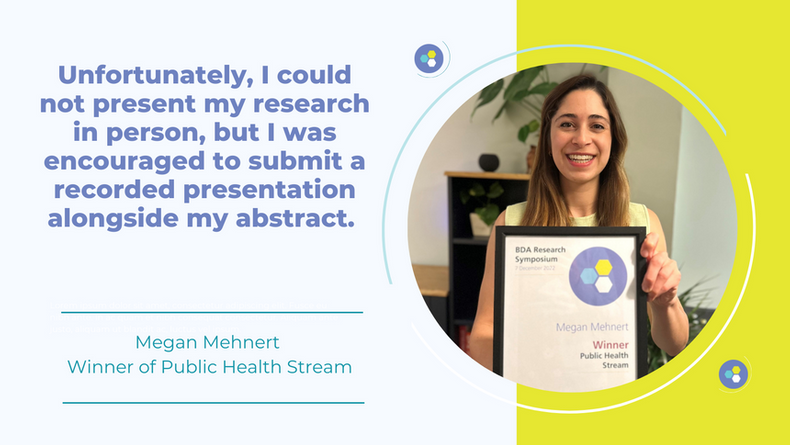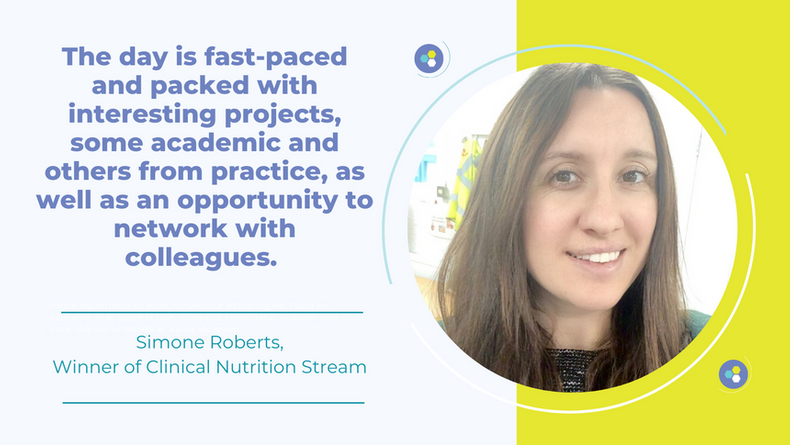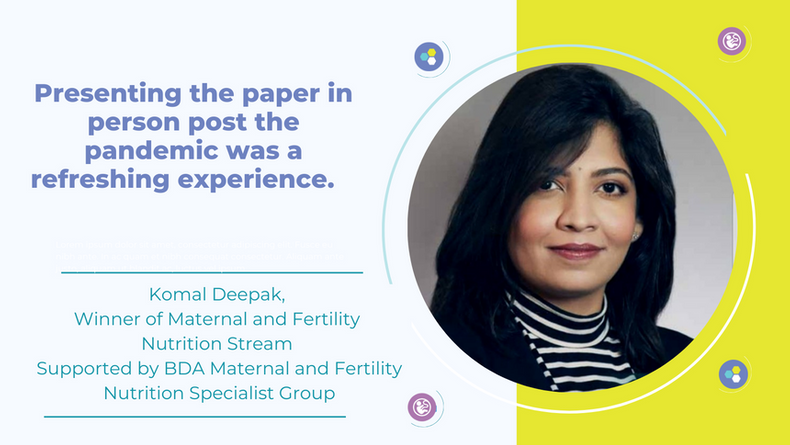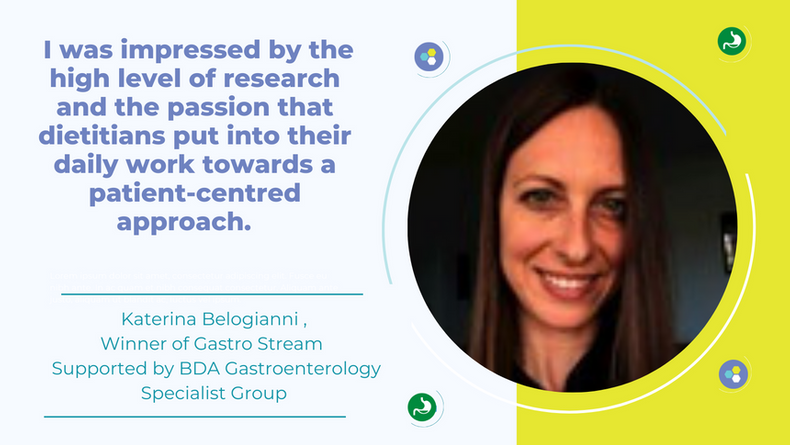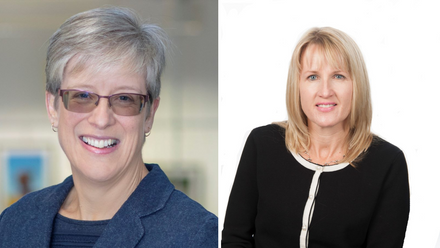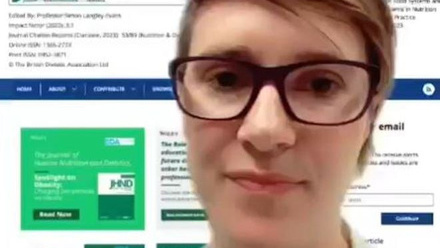The BDA Research Symposium returned in person for the first time since 2019 on Wednesday 7 December, with over 130 delegates joining us for our annual event showcasing the breadth of research across dietetics.
If we don't do patient research then we can't improve patient care. So the only way you can work out whether you are doing something right, or whether you can do it better, or quicker or offer it to more people is by doing some research to get the answers to those questions.

Judy Lawrence
Research Officer | British Dietetic Association
2022 Winners
Not only did we have a record attendance in Birmingham but student groups from University of Nottingham, University of Plymouth and University of Winchester joined us online to watch talks in the main room.
Symprove hosted the breakfast session, entitled; ‘Can probiotics help to alleviate symptoms in people with Long COVID?' This was presented by Dr Caroline Dalton, Associate Professor of Neuroscience and Genetics, Sheffield Hallam University.
I think it's crucial that Dietitians continue to question exactly what they are doing in practice and then undertake research studies in order to be able to develop new information. Not just for themselves, but for the whole dietetic profession and the wider nutrition community who can also benefit.

Professor Kevin Whelan
This year we saw 62 abstracts presented in person and three presented via recordings. These were presented across 12 streams and we are pleased to announce that there will be even more streams being launched next year. Diabetes will be included in this - so watch this space!
Felt very honoured to attend and present at the BDA research symposium today. Such an interesting and inspiring day listening to diverse topics. #BDAResearch https://t.co/qI7oIsqFDo
— Rachel (@rachel_jh_) December 7, 2022
We rounded off the day by announcing the winning abstract in each stream, the winners were:
New stream: Nutrition in Older Adults – Supported by BDA Older People Specialist Group
Elaine Penman for: Structured literature review of oral nutritional supplementation parameters for older people in the perioperative phase of fragility hip fracture recovery.
At University, we were encouraged to submit our final year honours projects to the BDA Research Symposium. Preparing the abstract felt like a great way to experience summarising and sharing my research and, with guaranteed peer-reviewed feedback, a further learning opportunity.
My research into oral nutritional supplementation for older adults experiencing a hip fracture followed my time as a nutrition assistant and volunteer on orthopaedic wards in Glasgow. The importance of strategies and interventions to support nutrition and hydration following a traumatic injury interested me, leading to research into the evidence behind new nutritional guidance in Scotland.
I’ve been a member of the BDA Older People Specialist group since joining the BDA in my first year as a dietetic student. I was delighted to see a new stream dedicated to this patient group and feel privileged to be selected as the winner for 2022. Presenting to an experienced audience was daunting, but I thoroughly enjoyed the day, meeting dietitians and students and hearing about the fantastic research work conducted in gastroenterology, public health, and critical care, amongst other topics.
Thank you to Marian Cunningham and Yvonne Brogan, Lecturers at Glasgow Caledonian University and the Dietetic department, for their support during the research process and encouragement to submit and attend the symposium.
Congratulations to @epenman, winner of the new stream Nutrition in Older Adults stream for “Structured literature review of oral nutritional supplementation parameters for older people in the perioperative phase of fragility hip fracture recovery”🎉@BDA_olderpeople
— BDA British Dietetic Association (@BDA_Dietitians) December 7, 2022
#BDAResearch pic.twitter.com/x5l2U1sW12
New stream: Supplementary Prescribing
Nicola Vernon for: The prescribing practices of intestinal failure dietitians. What are the barriers.
There is a lot of discussion about why dietitians aren’t independent prescribers, or what is needed to get to this. The answer, more published data on our prescribing practice. At the trust I work at, the non-medical prescribing policy requires a record of the medications prescribed (or de-prescribed) to be kept, as well as supervision sessions. In these supervision sessions, it was clear that there were many patients I had assessed and could have prescribed for but hadn’t. This led to the question ‘what are the barriers to dietetic supplementary prescribing' and the audit being devised.
Having undertaken audits, but not necessarily submitted for publication I didn’t know where to start! My very supportive and encouraging supervisor (and fellow prescriber Dr Alison Culkin), suggested the new prescribing stream at the BDA Research Symposium. There were very clear guidelines on how to layout the abstract and what to include, which got me started in putting words down on paper. Presenting on the day was also a very supportive and friendly atmosphere and a fantastic opportunity. I felt honoured to be there on the day, surrounded by amazing dietitians and all the research that is being undertaken.
Looking forward, there is still more data to collect on dietitians and prescribing, including the views of other HCPs. We need to publish more data on dietetic prescribing practice to support the initiative and move to independent prescribing. I encourage everyone who is prescribing to publish their data and if it’s your first endeavour in submitting to a conference, then I highly recommend the BDA Research Symposium 2023.
Congratulations to @NicVernonRD, winner of the 2022 new Supplementary Prescribing stream for “The prescribing practices of intestinal failure dietitians. What are the barriers?” 🎉
— BDA British Dietetic Association (@BDA_Dietitians) December 7, 2022
#BDAResearch pic.twitter.com/GHWgJn1VYi
Clinical Nutrition
Simone Roberts for: Improving Detection of Malnutrition in the Community: Tools used by Meals on Wheels and the Emergency Medical Services, a systematic review.
Presenting at the BDA symposium is a brilliant opportunity to share research with colleagues from across dietetic specialities. The day is fast-paced and packed with interesting projects, some academic and others from practice, as well as an opportunity to network with colleagues. Presenting to your colleagues can be very rewarding as you know you are directly contributing to the evidence base for the dietetic profession. It can also be daunting but the atmosphere at the symposium is always very supportive and there is lots of coffee to keep you focused. The research I presented formed part of my PhD at the University of Hertfordshire, focusing on the role of the Emergency Services and Meals on Wheels services in community malnutrition screening. Presenting the systematic review gave me the first opportunity to share my original research. The symposium was the first step to turning that systematic review into a publishable piece of work. Now, in the final year of the PhD, I have collected a lot of data, via interviews, focus groups, a content analysis, and an academic survey which I am currently in the process of turning into a dissertation, which fingers-crossed, is ready to submit at the end of this year. The best part of doing research is sharing the results and I hope to disseminate them via future symposiums and research papers.
Congratulations to @SimoneR_RD winner of the Clinical Nutrition stream, for " Improving Detection of Malnutrition in the Community: Tools used by Meals on Wheels and the Emergency Medical Services, a systematic review.” 🎉
— BDA British Dietetic Association (@BDA_Dietitians) December 7, 2022
#BDAResearch pic.twitter.com/CavDL83j0h
Critical Care – Supported by BDA Critical Care Specialist Group
Eimear Wall for: Nutrition support practices in critical care during the second wave of the COVID-19 pandemic – a service evaluation.
I was delighted to have been chosen as the winner of the Critical Care Stream of The BDA Research Symposium 2022, supported by the Critical Care Specialist Group. My abstract was presented as part of my MSc project from King’s College London. The aim of this study was to describe the nutrition support practices and clinical challenges encountered in providing nutritional support to critically ill COVID-19 patients during the second wave of pandemic. I was very fortunate to carry out this project under the guidance of my supervisors Dr. Danielle Bear and Dr. Alastair Duncan at Guy's and St Thomas' Trust and King’s College London
As a newly qualified dietitian, it was encouraging to see the many opportunities that exist for dietitians to carry out research that help to grow and strengthen the evidence base for our profession. It was a challenging but rewarding experience presenting to fellow professionals in the field of dietetics and I look forward to building on this experience in the course of my career.
The BDA Research Symposium is a fantastic platform for dietitians at all stages of their careers to both share and learn from the important research being carried out by dietitians across the UK. I would encourage any dietetic student or qualified dietitian to participate whether through presenting their research or simply by attending.
Congratulations to Eimear Wall, winner of the Critical Care Stream for care “Nutrition support practices in critical care during the second wave of the COVID-19 pandemic – a service evaluation”🎉 supported by @BDACriticalCare#BDAResearch pic.twitter.com/HAHmR0cCQn
— BDA British Dietetic Association (@BDA_Dietitians) December 7, 2022
Gastro – Supported by BDA Gastroenterology Specialist Group
Katerina Belogianni for: Development and Validation of a Knowledge, Attitudes and Practices Questionnaire in the dietary management of Irritable Bowel Syndrome.
It was a great honour and privilege that my work was recognised and awarded by esteemed dietitian colleagues during the BDA Research Symposium. This work could not have been completed without the support provided by my line manager, Dr Miranda Lomer. The aim of this research was to develop and validate a self-administered questionnaire that can used by dietitians and healthcare professionals to address knowledge, attitudes and practices in the dietary management of irritable bowel syndrome.
It was my first time attending a BDA Research Symposium and I was impressed by the high level of research and the passion that dietitians put into their daily work towards a patient-centred approach. BDA did a fantastic work in the organisation of the event and after the pandemic it was a great opportunity to meet and network with colleagues across the UK. I would strongly encourage all dietitians to attend similar events by BDA in the future.
Congratulations to @KateBelogianni , winner of the Gastroenterology stream for “Development and Validation of a Knowledge, Attitudes and Practices Questionnaire in the dietary management of Irritable Bowel Syndrome” 🎉 supported by @bda_gastro
— BDA British Dietetic Association (@BDA_Dietitians) December 7, 2022
#BDAResearch pic.twitter.com/1ZgX2EbepM
Maternal and Fertility Nutrition – Supported by BDA Maternal and Fertility Nutrition Specialist Group
Komal Deepak for: Nutritional management of functional gut symptoms in people with endometriosis: A cross sectional survey.
Presenting the paper in person post the pandemic was a refreshing experience. Since winning the best abstract in the BDA Research symposium, the paper got the recognition it deserves! The paper has now been published in the Journal of Human Nutrition and Dietetics. https://pubmed.ncbi.nlm.nih.gov/36794746/
Each small step towards getting individuals with endometriosis the right dietetic care feels like a giant leap! But this has not been easy… it was four years' worth of brainstorming, failing initial attempts at data collection and persevering through. It helps to have the support of a good research supervisor; I have been fortunate to have had Dr Kate Maslin support my vision. When the strategic study idea finally came together, it was followed by getting support from the University of Plymouth and Endometriosis UK to make the vision a reality!
The hope for the next steps is to consolidate current evidence for dietetic involvement in endometriosis and evaluate its effectiveness. In the long pursuit of research, wins such as this help reinforce the ‘Why’ of the project.
I am very grateful for being able to get a platform by BDA to voice our findings.
The winner was given a free place on the Nutrition in Pregnancy Course held in January/February 2023 – Find out more about the course.
Congratulations to @Komaldeepakk, winner of the Maternal and Fertility Nutrition stream for “Nutritional management of functional gut symptoms in people with endometriosis: A cross sectional survey” 🎉 supported by @BdaMaternal #BDAResearch pic.twitter.com/3OD5ohFg17
— BDA British Dietetic Association (@BDA_Dietitians) December 7, 2022
New to Research – Supported by Yakult
Nicole Robertson for: A qualitative study of the experiences of dietetic care in eating disorder treatment.
The abstract I submitted to the symposium was from my postgraduate dissertation completed at the University of Chester. I was really grateful for the opportunity to present my research, which looked into the role of a dietitian in eating disorder treatment, as this is under-researched area and one that I am hugely passionate about. My research identified several themes describing the experiences of dietetic care from the perspectives of both dietitians and recovered eating disorder patients. I hope that the findings will help support improvements in quality of dietetic care for eating disorder patients.
Throughout completing my research, I encountered numerous challenges, including learning about completing qualitative research, making changes to the research methods due to COVID-19 restrictions, and completing my project at the evenings and weekends alongside working full-time. This all helped me to learn skills in organisation, time management and perseverance. The symposium was a fantastic platform to be able to develop my presentation skills and network with fellow researchers.
I was thrilled to be named as the winner of the New to Research stream, especially considering the amount of high-quality research that was presented throughout the day. It was inspiring to hear all the amazing research that is being completed across different areas of dietetics, and I look forward to being able to conduct and present further research in the future.
Congratulations to Nicole Robertson, winner of the New to Research stream for "A qualitative study of the experiences of dietetic care in eating disorder treatment"🎉 supported by Yakult#BDAResearch pic.twitter.com/Wb3jtriKxV
— BDA British Dietetic Association (@BDA_Dietitians) December 7, 2022
Nutrition Support – Supported by Parenteral and Enteral Nutrition Specialist Group
Oscar Walton for: Cross-Sectional Study of Registered Dietitians’ Perspectives on Training to Position Nasogastric Tubes.
To present at the 2022 BDA research symposium was an honour and to be awarded for my research was a lovely surprise. My study aimed to identify dietitians’ opinions of training to position nasogastric tubes and explore the perceived impact of this skill. After chatting to dietitians at Birmingham’s Queens Hospital who had upskilled to position nasogastric tubes I was really interested in other dietitians’ opinions of this skill and how it could affect their practice, which was the start of it. This project was part of my MSc in Dietetics at Birmingham City University and completed during C-placement. Of course, as everyone found, the pandemic and accompanying were challenging and credit is due to my project supervisor Ruth Stow for helping me complete it and my colleagues Bruno Mafrici and Tig Bridge for encouraging me to submit the project to different conferences and symposiums.
This symposium was the first face to face since 2019, it had a brilliant atmosphere, I think everyone was to be happy to be in person, socially learning. There were variety of streams, I found the new stream of supplementary prescribing, and critical care and gastro streams particularly interesting. I presented during the nutrition support stream which was a great experience and being able to share my findings and have feedback from peers was incredibly rewarding.
I’m currently working with another dietitian on a project looking at dietitians who have experienced having an NGT; how they found the experience and exploring any perceived impact on practice. In the long term I am very interested by supplementary (or primary) prescribing and training to position nasogastric and potentially nasojejunal tubes. I recently became a renal dietitian and a dad, so I am currently focussing on consolidating skills for both of these roles.
Congratulations to Oscar Walton, winner of the Nutrition Support stream, for “Cross-Sectional Study of Registered Dietitians’ Perspectives on Training to Position Nasogastric Tubes.” 🎉 supported by @BDA_PENG#BDAResearch pic.twitter.com/KQQ3gqoSZz
— BDA British Dietetic Association (@BDA_Dietitians) December 7, 2022
Obesity – Supported by BDA Obesity Specialist Group
Emily Nelson for: A secondary analysis of the DROPLET Study: body composition as a predictor of weight loss.
It was a real surprise and honour to receive this award in the obesity stream. This was my undergraduate final year project, contributing to my degree in dietetics from the University of Surrey.
I decided to enter the abstract over summer, and worked with my supervisor to adapt the abstract suitably. I was thrilled when it had been accepted, and worked further on making a presentation to encapsulate the research’s message.
The research focused around finding out if weight loss could be predicted by resting energy expenditure and body composition. Given the incredible plethora of abstracts within the obesity stream, I felt very shocked and privileged to win this award.
The opportunity to present this allowed me to hone my skills in adapting information for a professional audience, and in presenting succinctly whilst ensuring all information is communicated effectively. I am very grateful to the incredible team at Surrey that helped in adapting my abstract, and to my personal tutor Emily Betts who encouraged me to apply.
The BDA symposium is a fantastic opportunity to not only present and share your own research, but also to discover the vast topics and pioneering research from dietitians. It was so inspiring to see so many dietitians carrying out research alongside their clinical practice, and this has definitely encouraged me to continue reading and conducting research throughout my clinical role as a dietitian.
The winner has been provided with a free place at the Obesity Specialist Group 2023 Study Day.
Congratulations to Emily Nelson, winner of Obesity stream for “A secondary analysis of the DROPLET Study: body composition as a predictor of weight loss.” 🎉 supported by @BDA_Obesity
— BDA British Dietetic Association (@BDA_Dietitians) December 7, 2022
#BDAResearch pic.twitter.com/jmGxlvZjlS
Paediatric – Supported by BDA Paediatric Specialist Group
James Evans for: Cross-sectional survey investigating nutrition support practices and opinions toward gastrostomy use across United Kingdom paediatric bone marrow transplant centres.
It was an honour to present my research; a survey of nutrition support practices and opinions toward gastrostomy use across UK paediatric bone marrow transplant centres, at the BDA Research Symposium 2022. This was an opening work package of my PhD research which laid the foundations for my future work in this field. This involves a mixed methods study comparing complication and outcomes of gastrostomy versus nasogastric tube feeding in paediatric bone marrow transplant, alongside parent and child experiences of using either tube. This work will improve patient care and facilitate decision making between families and clinicians when considering options for enteral tube feeding prior to transplant.
Hopefully I will get the opportunity to present more of my research at a future symposium. The day was full of fantastic research being undertaken by dietitians at all stages of their career, from undergraduate to doctoral level, as well as by dietitians working in clinical practice. Research projects covered a wide range of clinical specialities, so the day really offered something for everyone, whatever your particular clinical interest. In the sessions I observed the audience was very supportive and it felt like there was a great camaraderie amongst everyone who was presenting on the day.
The winner has been provided with a free place at the Paediatric Specialist Group 2023 Study Day.
Congratulations to @JamesEvansRD, winner of Paediatric stream for “Cross-sectional survey investigating nutrition support practices and opinions toward gastrostomy use across United Kingdom paediatric bone marrow transplant centres” 🎉 supported by @BDA_Paediatrics#BDAResearch pic.twitter.com/WTPqFmJuVC
— BDA British Dietetic Association (@BDA_Dietitians) December 7, 2022
Public Health
Megan Mehnert for: An investigation into the link between cooking from scratch and vegetable consumption; a cross-sectional survey of adults in the UK.
When writing my university dissertation, I never would have expected it to go beyond my university network's reach. So when I found out my abstract had won the Public Health stream for 2022, I was delighted! I was so pleased that I was able to share these findings with such an audience of nutrition experts and even more so to be recognised for it. My abstract was titled 'An investigation into the link between cooking from scratch and vegetable consumption; a cross-sectional survey of adults in the UK.'
As a prime opportunity to name-drop...thank you to my Cardiff Met dissertation supervisor, Laura Low (RD), for her support throughout the dissertation and symposium application process. It was a great reason to consolidate my dissertation and to have a polished abstract that I am proud of, in an area of work I am passionate about. I recommend it to anyone considering applying this year.
Unfortunately, I could not present my research in person, but I was encouraged to submit a recorded presentation alongside my abstract. Although I am sad to have missed the opportunity to spend the day with other dietitians passionate about research and progressing the field of dietetics, this opportunity has still allowed me to connect with other dietitians with similar interests online, for which I am grateful.
Investing in research and sharing it with dietitians who can build on this and put it into practice when working with patients or who are involved with shaping dietetic practice is crucial for driving change.
I look forward to seeing what the 2023 research symposium holds.
Congratulations to Megan Mehnert, winner of the Public Health stream for “An investigation into the link between cooking from scratch and vegetable consumption; a cross-sectional survey of adults in the UK” 🎉 @BDAPublicHealth #BDAResearch
— BDA British Dietetic Association (@BDA_Dietitians) December 7, 2022
Service Evaluation
Abigail Platt for: Evaluation of the dietary intake of children and adolescents with a diagnosis of avoidant/restrictive food intake disorder (ARFID) in the United Kingdom: an observational service evaluation.
It was an honour to be able to present my research at the 2022 BDA Research Symposium, and I was absolutely delighted to win best abstract in the service evaluation stream.
I conducted my research for my final year research project at university. This was my first exposure to research and during the 8 months I dedicated to this I learnt valuable skills across all areas from writing up my literature review, through to data collection, analysis and presentation. Being able to then present my research in the form of an abstract at the symposium was the perfect way to round off my dissertation. Although initially daunting standing up there with those who were more experienced in dietetic research, by the end of the day my confidence had grown and I was proud to be able to discuss my research project. I would recommend this experience to any dietetic student coming the end of their degree, it really is the perfect way to showcase all our hard work and learn more about the future of dietetics from other research.
The whole experience has given me a newfound appreciation for research, and it was an absolute pleasure to be able to contribute to the Feeding and Eating Disorder Service at Great Ormand Street Hospital. I hope to continue researching throughout my dietetic career, and possibly even to participate in future research symposiums!
Congratulations to Abigail Platt, winner of Service Evaluation for “Evaluation of the dietary intake of children and adolescents with a diagnosis of avoidant/restrictive food intake disorder (ARFID) in the United Kingdom: an observational service evaluation.”🎉#BDAResearch pic.twitter.com/01nYXEMzXU
— BDA British Dietetic Association (@BDA_Dietitians) December 7, 2022
Get involved next year
Abstract submission for 2023 will open in April 2023 and close in July 2023.
The Research Symposium was sponsored by Yakult and Symprove.



